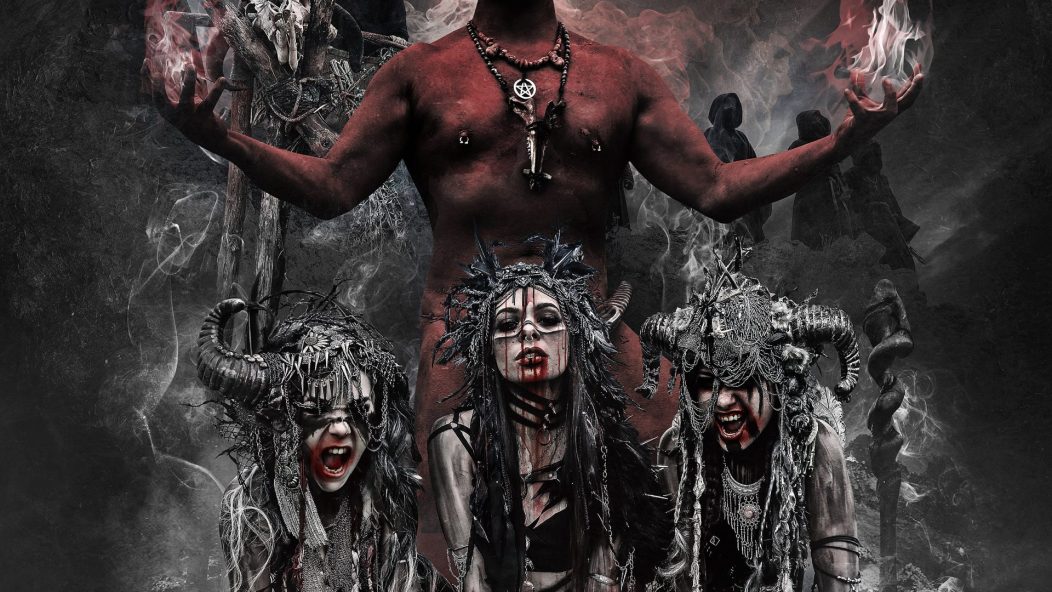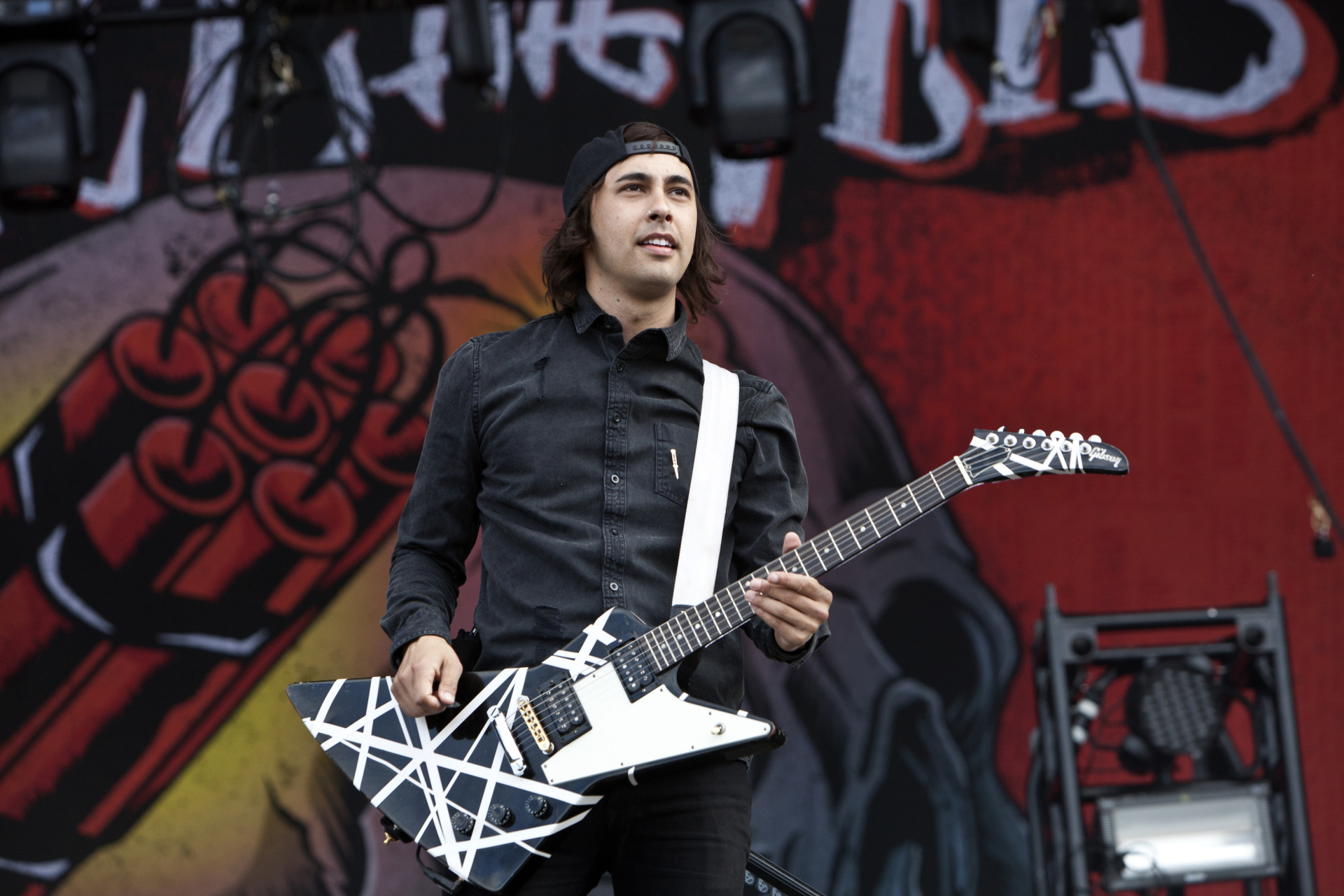
Atrocity Concludes Their “Okkult” Album Trilogy (Interview)
Formed in 1988, Germany’s Atrocity started its career by playing a form of vicious grindcore/death metal before morphing into a powerhouse technical death metal troupe with their first two full-length albums: Hallucinations and Todessehnsucht.
Starting in 2013, the band embarked on an adventurous endeavor of creating part one of a three-part album trilogy called Okkult. In five-year intervals, Atrocity has now completed the triumvirate of releases with its most heavy and dynamic of the three with Okkult III. Okkult dealt with lyrics inspired by mythic and mysterious topics, conspiracy theories, and witchcraft, decorated with symphonic elements, while Okkult II introduced more choirs with a melodic and atmospheric touch.
Featuring vocalist/keyboardist/founder Alexander Krull, drummer Joris Nijenhuis, guitarist Micki Richter, bassist Andre Nasso, and new guitarist Luc Gebhardt, Atrocity has completed the album trilogy with Okkult III, by far the band’s most heaviest of the three parts. During a recent Zoom chat, Alexander Krull spoke about the new album, his involvement in Viking battle reenactments, his other band Leaves’ Eyes, and touring plans for Atrocity.
…
…
This is the third part and the finalé of the Okkult album trilogy, how does this wrap up the story? Talk briefly about the writing process.
I wanted to have a great final of the whole Okkult trilogy. It had to be the most brutal one, the most riff oriented, and the most heavy one of them all. I think all other three albums have their own kind of trademarks. But it is a trilogy and they are connected of course. But repeating three times recording the same album was no option at all. We took it that way that maybe the first one has the most symphonic elements. The second album, Okkult II, there were some choirs in there to contrast to the heavy and brutal sound. On this one, it’s summing up the essence of the two parts by bringing back even more heaviness in the music.
It was recorded at Mastersound Studio by yourself. Talk about the recording process, what type of sound or tone were you trying to achieve?
The whole concept is about the dark side of humanity and mankind’s worst nightmares. There are some obscure stories, so they demand a really dark and evil, but also brutal sound. I wanted to have an organic production and not something synthetic. What I like about that sound, especially now on the Okkult III, is the guitar sound. It’s like a wall of sound, but we also have really punchy drums. And don’t underestimate the bass… It turned out exactly like my vision was, to have an evil bulldozer in your face when you’re listening to the album. But also having these atmospheric parts, there has to be some transparency. It should sound like layers within the music, so you can hear all the details going on.
You mentioned the album being about the dark side of human history, and a lot of the songs deal with that. One track in particular that I’d like to bring up is “Born To Kill.” As a German, what does it mean to you to keep the awareness of these atrocities of history by writing and singing about events that took place many years ago?
With “Born To Kill,” you have to go back to the end of the First World War. The video, if people saw that, it’s just put in another context. It’s like a post apocalyptic world but having the same message about betrayal, about people doing dark things. In Germany, we had democracy going on in the Weimar Republic, the aristocracy was gone. But aristocrats, they still wanted to gain power, still wanted to gain it back. So, there was an unholy alliance between military groups, former generals, and soldiers and aristocrats. Usually, those guys would not really get along with each other. They were not best friends, but it was like I said, an unholy alliance because they set up a very evil conspiracy raising an army behind the politicians backs, behind the whole world. They had secret training in Russia, an irony of history so to say. Military groups also from the Nazis were also part of that. But not only them, that is the thing people have to understand that the Versailles contract after the First World War was probably a huge mistake. Because that gave such people the opportunity to radicalize all kinds of people. So they had one goal, they wanted to have a strong German realm in the center of Europe because they saw everywhere as enemies. We were the heart of Europe, we had the biggest country and most powerful country in the center of Europe and back in the day they were always afraid of everyone around. If you see nowadays what’s going on in the world, it’s not so far away from these hard times that we thought we left them all behind, when everybody was saying after the Second World War, no more war in Europe. Or no weapons and we should all get along in peace and stuff like that. That is a perfect warning signal for times like these. Crazy times demand crazy music. It’s like a mirror for society, or for people who are into history. People can always see that if you give them too much power, you’ll have a big impact on life or places or events and history itself. It was not always turning out for the best.
There’s a lot of great guest contributions on the album. The one that stands out the most is the spoken word performance and screams by Polish actor, musician and book author Igor Górewicz on “Cypka.” How did this come about?
Igor is a very good friend of mine. We are in the brotherhood together; I’m also doing Viking lifestyle and Viking reenactment. I’m in the biggest, modern Viking army there is. I do sword fighting twice a week and training; it’s a big thing. It’s international, so we are spread out in dozens of countries, also in the US and across the globe. But of course, the main part is here in Europe, and Igor is also the commander of the (Viking reenactment outfit). But Igor’s also doing a lot of other things; he’s writing books, he’s an author, but he’s also like you mentioned, an actor and stunt advisor. He’s worked with bands like Amon Amarth, Sabaton and Kreator. (For “Cypka”), Igor told a very sick and obscure story. He stated about a guy, a serial killer, who killed people and sold the flesh to the local butchers and they were making sausages out of them. And that’s a true story; they caught the guy after many years. They found 30 corpses in the lake where Igor was living next to. So of course, if we talk about the dark human side of a mass murderer and serial killer, that was the story we have to write about. So it all came together and of course I chose Igor to talk in Polish like it was when the police found the guy and what they found in his flat and all the stuff connected to that. It was a really great collaboration I have to say.
There’s also a lot of sound effects created by Katie Halliday (SAW, Stranger Things, The Strain, Star Trek: Discovery). How did that support the atmosphere of the album?
We were on tour in Canada, and after the gig I met her at the bar. She was hanging out with some Canadian friends and so we were just talking and then she told me she was also working in the studio, a very cute girl. I asked her what she did and she said she did sound effects for the Saw series of movies. Then I told her about the Okkulttrilogy, so she made, especially for us for the whole trilogy, a library for what we could use as sound effects. It was amazing. I was watching Stranger Things, and I was one of the guys joining this very late in the moment, because everybody talked about it. And then I was like, “Wow, this sounds a little bit familiar here and there.” And indeed it was her doing the sound effects for that TV show. She’s an absolutely great person and also a metal fan.
The blazing guitar solos and whammy bar dive bombs are fantastic! Micki and Luc trade off?
(Because of Covid-19) I only had a chance to get one person on this (in the studio) and it was actually all recorded by Micki. Recording wise, we were really limited at these times. When we were writing the songs together, and actually the former guitar player Thorsten (Bauer) was also still in contact basically every day. So when he left, Luc joined the band. So we had already done all the guitar recordings, and we were talking about it if you want to change anything. Also, Luc can also play something on that. And he said, “No, that’s just fine” and he will just take the solo parts. So (there was) no problem with that. When we were writing, we had an absolutely great time. When the whole world was turning upside down, we were sitting in the studio writing a soundtrack for this!
The awesome artwork by Stefan Heilemann (Lindemann, Dimmu Borgir, Epica) perfectly fits the music. Did you have to give much direction to Stefan and what material did you provide for him?
I don’t want to call myself a control freak or anything. But probably in a way, if I have a vision, I really tell people details about it. Stefan Heilemann is a longtime collaborator, and he has absolutely his artistic freedom. When we do something new, we see together a kind of concept, which we both like to work on. Then something like this comes out at the end. He’s a really great artist and he lives in our area.
Is there any news on Leaves’ Eyes? Are you working on new material and is there a tentative release date for next album?
We just met in the holidays with Elina (Siirala) and we were writing new material. We actually plan to release a new album in autumn. I hope we will manage the new deadlines, which are ridiculous upfront. So we have to see with that. Besides, we are cool with great new material. And that makes it so cool as a person like me will also work with diverse music, and also with other artists who have such cool bands and doing different things.
Obviously, Atrocity is very different from Leaves’ Eyes. Is it just a different mood and another way to express yourself creatively by being in each band?
From the artistic side, we have also new challenges creating new music of stories or a concept behind this. It’s like painting pictures. I’m also a painter and I like to draw stuff and so forth. So that fits very well to explain it like that. With Atrocity, I probably have this dark side that I can fulfill with metal songs. And then on the other side, you have the Viking Alex, writing songs about Norse mythology.
What’s next for Atrocity, including touring plans?
We go to the 70,000 Tons of Metal cruise, and have our release shows on the boat, which is really awesome. And then we are planning on touring; we have some festivals in the pipeline and stuff. But also regarding tours, because we were waiting so long now and the last year was really a pain in the ass, so to say. When the first festivals were popping up and we felt like we could play again, there was a war coming. Our first picks would have been in Russia. So no shows there, of course. And then in the summertime, I got the Corona (virus) and we couldn’t play festivals. I was having nothing with it in the pandemic in the heyday, so to say, and then when we could play again, I got that thing.
…
Okkult III was released on January 20th, 2023 via Massacre Records.










